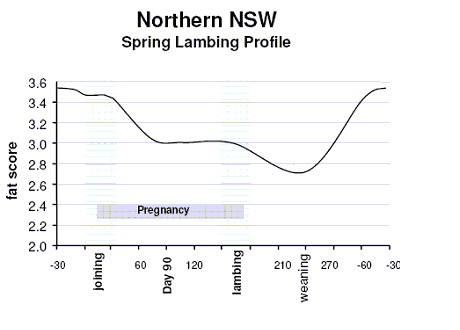|
This zone is characterised by
hot summers and cold winters
and pastures include a mix
of perennial grasses and
legumes and annual grasses.
Due to a shorter growing
season and slow winter
growth, there are
differences in pasture
growth rates and total feed
on offer produced. This
affects the potential
stocking rate and pasture
utilisation and therefore
affects the recommendations
for ewe management.
The economic analysis that
supports these
recommendations for
this region will be posted
on this site in August 2007.
Ewe Fat Score Targets
Production from ewes and
their progeny can be
predicted with confidence
from knowledge of the ewe
Fat Score (FS)
profile. The profile
sets the FS targets for key
times during the
reproductive cycle. Ewe FS
at joining and at lambing
set the framework of the
profile and the
environmental conditions,
including expected level of
pasture available in
late-pregnancy, dictate the
shape of the profile for a
particular region. There is
no universal optimum
production system and the
'optimum' ewe FS targets
will differ for different
environments, production
systems (e.g. genotype, time
of lambing, flock structure)
and commodity prices. The
best approach for improving
stocking rates is to adopt
stocking policies and
grazing management practices
which takes account of the
large between and within
years differences in pasture
production at any location.
Fat Score Profiles:
Fat Score profiles and
targets vary between region,
lambing times and enterprise
type. These graphs
outline the targeted FS
profile and acts as a
constant reference for how
your mob is performing.
Print out and plot the FS of
your mob against the
targeted FS profile, so that
by the end of the year you
have a FS profile for your
own ewes. Remember -
ewe FS for joining can be
influenced from weaning and
therefore it is important to
monitor changes in ewe
condition between weaning
and joining.
Fat Score Targets
for Northern and
Northern Tablelands NSW
[Joining in April]

print friendly
version
Or choose the topic
required:
Improving ewe fleece
weight and wool
quality
Ewes in better
condition at joining
conceive more lambs
Improving lamb
survival
More productive
lambs through better
ewe management
Managing twinning
ewes for higher
production
Managing ewe
mortality
Feed
Budgeting
NSW lifetimewool
newsletters
(to be added to
the mailing list please
email Sue
Hatcher)
January
2005
April
2005
July
2005
October
2005
January
2006
April
2006
October
2006
April
2007
July
2007
October
2007
NSW DPI
Primefacts
Maiden
Merino ewe Conception
Rates
How
responsive is the
conception rate of your
Merino ewes?
Fat
score of ewes at
joining: the benefits of
optimal nutrition
For more information on the
northern sheep zone please
contact;
Michael Lollback - DPI
Tamworth 02 67631257
For more information on
lifetimewool in NSW please
contact
Sue Hatcher,
Jane Mason - DPI
Orange 02 6391 3861
Sally
Martin - DPI Young 02
6382 1077
Phil Graham -
DPI Yass 02 6226
2199
Michael Lollback -
DPI Tamworth 02
67631257
|